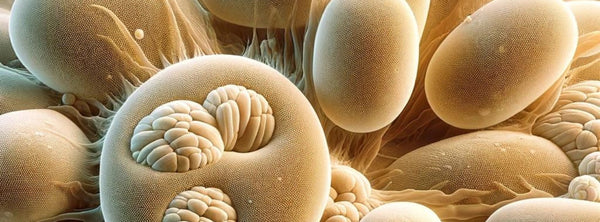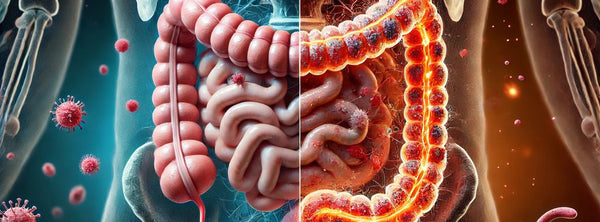
-
The Significance of Constipation: A Closer Look
While constipation may not be the most captivating topic in the realm of health, it remains crucial to comprehend its implications, as improper bowel evacuation can have detrimental effects on one's well-being.
Constipation is characterised by infrequent and challenging bowel movements that are hard and dry. It can be caused by identifiable factors or have an unknown origin, known as idiopathic constipation. [1] While many medical resources primarily focus on chronic constipation, there is often a lack of guidance for individuals who experience bowel movements only once every two or three days. However, at the Vitality and Wellness Centre, we recognise the importance of maintaining a daily toilet routine to eliminate toxic buildup and establish a strong foundation for overall health.
Within this blog, we provide a comprehensive exploration of constipation, covering vital aspects such as its signs and symptoms, underlying causes, and the adverse effects it can have on individuals. By discussing the signs of constipation, we aim to increase awareness and recognition of this condition. We delve into the various factors that can contribute to constipation, helping readers gain a deeper understanding of its root causes. Additionally, we emphasise the detrimental effects that constipation can have on overall health. We provide insights into a wide range of holistic treatment approaches, focusing on lifestyle adjustments, dietary changes, and natural remedies. By doing so, we empower readers with practical and effective methods to naturally address constipation.
For More Information Please Click On The Tabs Above.
-
Recognising the Signs of Constipation
- Not passing at least 1 bowel motion per day
- Decreased urge or diminished desire to have a bowel movement
- Experiencing dry and hard stools that can cause pain during elimination
- Struggling and exerting excessive effort to pass a bowel movement
- Spending prolonged periods (10-15 minutes or more) on the toilet, attempting to have a bowel movement
- Sensation of incomplete emptying of the bowels after elimination
- Abdominal bloating, causing a feeling of fullness and discomfort
- Abdominal pain or cramps, contributing to overall discomfort
For More Information Please Click On The Tabs Above.
-
Exploring the Root Causes of Constipation
Constipation can be attributed to a multitude of factors, and what may cause it in one person might not serve as the trigger for another individual.
Dehydration:
Stands as a prevalent underlying cause of constipation. As the remnants of digested food travel from the small intestine to the colon, they contain a significant amount of liquid. The colon absorbs a substantial portion of this liquid, allowing the formation of a well-lubricated stool that effortlessly traverses the large intestine. However, when an individual is insufficiently hydrated, constipation can ensue. [2] In response to the body's urgent need for fluids, the brain signals the colon to maximise liquid absorption. Consequently, the stool loses moisture, becoming dry and more difficult to pass through the intestinal tract.
Insufficient intake of Dietary Fibre:
Constipation is often associated with a lack of dietary fibre. [3] Fibre offers multiple health benefits, including its ability to add bulk to the stool by absorbing water and creating a gel-like substance. These properties help the stool glide through the colon more easily, facilitating its elimination from the body. Foods devoid of fibre, such as white flour products, sugar-rich foods, fried foods, and refined carbohydrates like white rice, are considered constipation-inducing. Conversely, foods high in fibre, such as fruits, vegetables, nuts, seeds, herbs, legumes, pulses, beans, and whole grains like brown rice, are beneficial for relieving constipation. However, it's important to note that certain individuals may experience constipation as a result of fibre intake, particularly if they have underlying conditions like dysbiosis, intestinal inflammation, or food allergies. Addressing these underlying issues can help alleviate fibre-induced constipation, allowing fibre to generally promote regular bowel movements.
Dysbiosis:
Refers to an imbalance between beneficial and harmful bacteria in the intestinal tract. When an excess of detrimental organisms resides in the intestines, the delicate equilibrium maintained by healthy bacteria becomes disrupted. Dysbiosis can result in toxicity and inflammation, which in turn leads to the drying out of faeces. Harmful organisms also interfere with intestinal muscle contractions, causing a slowdown in the transit time of faeces through the colon and an increased reabsorption of water from the stool. [4] These combined effects significantly contribute to the development of constipation.
Food Allergies:
Underlying food allergies or sensitivities can frequently contribute to the occurrence of constipation. [5] Food allergies trigger an immune response that leads to heightened intestinal inflammation and nerve irritation. As a consequence, the communication between the colon muscles and the messages instructing them to propel the faeces through the intestines becomes disrupted, impairing the smooth movement of stool.
Pharmaceutical Medication:
Pharmaceutical medications can sometimes be associated with constipation as a side effect. Certain medications, such as opioids, anticholinergics, calcium channel blockers, and certain antidepressants, can impact the normal functioning of the digestive system, leading to slowed intestinal motility and decreased bowel movements. These medications may disrupt the natural muscle contractions in the intestines, impairing the smooth passage of stool.
-
Opioid Analgesics:
Opioid pain medications: including codeine, morphine, oxycodone, and hydrocodone, are known to cause constipation as a common side effect. Opioids affect the gastrointestinal tract by slowing down bowel movements and increasing water absorption in the intestines.[6]
-
Antacids with Aluminium or Calcium:
Some antacids that contain aluminium or calcium, such as aluminium hydroxide or calcium carbonate, can cause constipation. These substances can have a binding effect on the stool and reduce bowel movements. [7]
-
Laxatives:
Can paradoxically contribute to constipation. These substances function by artificially stimulating or irritating the nerves in the colon, prompting the intestinal muscles to contract and facilitate the elimination of feces from the body. However, excessive and prolonged use of laxatives can result in damage to the intestinal nerves and weaken the muscular function of the intestines, impairing normal colon function. Regrettably, individuals may become reliant on increasingly higher doses of laxatives to maintain effective bowel movements, leading to a dependency on these substances.
-
Anticholinergic Medications:
Certain medications with anticholinergic properties, such as some antihistamines (e.g., diphenhydramine), antipsychotics, and certain bladder medications (e.g., oxybutynin), can cause constipation. These medications can disrupt normal bowel function by decreasing intestinal motility.[8]
-
Calcium Channel Blockers:
Medications used to treat high blood pressure and certain heart conditions, such as diltiazem and verapamil, belong to a class of drugs called calcium channel blockers. These medications can lead to constipation by relaxing smooth muscles in the intestines, slowing down bowel movements.[9]
-
Antipsychotics:
Certain antipsychotic medications, such as chlorpromazine and clozapine, have been associated with constipation. These drugs can affect bowel motility by blocking dopamine receptors in the gut.[10]
-
Antispasmodic medications:
Including dicyclomine and hyoscyamine, are prescribed to relieve symptoms of irritable bowel syndrome (IBS). However, they can also cause constipation as a side effect by reducing intestinal muscle contractions.[11]
-
Diuretics:
Diuretic medications, such as furosemide and hydrochlorothiazide, are commonly prescribed to increase urine output and treat conditions like high blood pressure and oedema. These drugs can cause constipation by reducing the fluid content in the intestines, leading to harder stools.
-
Antidepressants:
Some antidepressant medications, including tricyclic antidepressants (TCAs) and selective serotonin reuptake inhibitors (SSRIs), may cause constipation as a side effect. These medications can affect the function of the gastrointestinal tract, leading to slowed bowel movements.
Lack of Exercise:
Leading a sedentary lifestyle and lacking physical exercise can contribute to constipation. Movement and exercise play a crucial role in alleviating constipation by reducing the transit time of stool through the colon and limiting excessive water reabsorption from faeces. [12] Physical activity helps stimulate peristalsis, the natural contractions of the intestinal muscles responsible for propelling stool through the colon. By promoting regular movement and muscle activity in the intestines, exercise aids in the smooth passage of stools and supports overall bowel function.
Ignoring the urge to pass a stool:
Neglecting the impulse to have a bowel movement can have negative consequences over time. By consistently resisting the natural urge to defecate, the nerve signals and communication between the brain and the bowels weaken. This weakened stimulus diminishes the prompt that indicates the need to have a bowel movement. Consequently, the transit time of faeces in the intestines increases, allowing them to linger longer than necessary. Eventually, this prolonged retention of stool can result in the development of constipation.
Long-term stress:
Persistent or prolonged stress activates the Sympathetic Nervous System, causing a redirection of blood flow away from the digestive tract. This, in turn, slows down the overall digestive process, including the movement of stool through the colon. Additionally, stress can deplete magnesium levels, potentially leading to spasms in the intestinal muscles and a constriction of the colon. These effects reduce the ability of faeces to smoothly pass through the large intestine, ultimately contributing to the development of constipation. [13]
Pregnancy:
Constipation is a common occurrence during pregnancy, affecting nearly 50% of all pregnant women. The hormone progesterone undergoes a significant increase during pregnancy to support a healthy gestation. One of its effects is the relaxation of the bowels, allowing food to remain in the digestive system for a longer duration. This extended transit time can enhance nutrient absorption, benefiting both the baby and the mother. However, the downside of this slowed movement is the potential for constipation if the faeces remain in the intestines for an excessive period, leading to "traffic jams" and difficulty in elimination. Furthermore, as the child and uterus continue to grow, they can exert pressure on the colon, impeding the movement of faeces and contributing to constipation.
Iron supplements:
Constipation can be induced by iron supplements, specifically the form known as ferrous sulphate. However, other variations of iron, such as iron citrate, iron glycinate, and iron chelate, do not appear to pose the same issues in terms of constipation.
Health ailments:
Various health conditions can contribute to constipation, including diabetes, irritable bowel syndrome, diverticulitis, colon cancer, Parkinson's disease, multiple sclerosis and stroke. These ailments can affect the normal functioning of the digestive system, leading to changes in bowel movements and potentially causing constipation.
For More Information Please Click On The Tabs Above.
-
-
Adverse Effects of Constipation
The side effects of Constipation can affect everyone differently. Some people suffer from multiple symptoms and others only a few.
Bad breath:
Unfortunately, constipation can cause a backlog of faeces in the intestinal tract. For some individuals, this can lead to gases rising back up and resulting in unpleasant-smelling breath.
Brain fog:
Constipation and the reabsorption of toxins can cause inflammation and nerve irritation, which crosses the blood-brain barrier and leads to brain fog. This can manifest as difficulty concentrating, mental fatigue, memory problems, and reduced cognitive functions.
Depression and Anxiety:
Studies have shown that the prevalence of depression and anxiety is more common in individuals with chronic constipation. [14] The exact mechanisms behind this association are not fully understood, but it is believed that the gut-brain connection and neurotransmitter imbalances may play a role.
Elevated cholesterol:
Regular bowel movements are essential for eliminating excess cholesterol from the body. Chronic constipation has been linked to higher cholesterol levels and an increased risk of heart disease factors. [15]
Faecal impaction:
Faecal impaction occurs when the lower part of the colon and rectum become jam-packed with hardened faeces. This condition can lead to severe constipation, abdominal discomfort, and an inability to pass stool. Medical intervention, such as stool softeners or manual disimpaction, may be necessary to relieve the impaction and restore normal bowel function. [16]
Faecal incontinence:
People who suffer from faecal impaction or chronic constipation may also experience episodes of involuntary dribbling or leakage of faeces. This can be embarrassing and significantly impact a person's quality of life. [17]
Haemorrhoids:
Chronic straining during bowel movements, often associated with constipation, can contribute to the development of haemorrhoids. Haemorrhoids are swollen blood vessels in the rectum or anus that can cause pain, itching, and bleeding.[18]
Headaches:
Constipation can be associated with headaches as the body is unable to effectively eliminate toxins. These toxins can be reabsorbed back into the bloodstream, placing a greater burden on the liver and potentially triggering headaches.[19]
Leaky Gut Syndrome:
Chronic constipation can contribute to a condition known as Leaky Gut Syndrome or Intestinal Permeability. In this condition, the intestinal lining becomes more permeable, allowing undigested food particles, toxins, bacteria by-products, and even faecal matter to cross into the bloodstream. [20] This can trigger immune responses, inflammation, and systemic health issues.
Loss of appetite:
Constipation can lead to uncomfortable bloating, causing a sense of fullness and a reduced desire to eat. The physical discomfort and altered gut function associated with constipation can contribute to a loss of appetite.
Rectal prolapse:
The straining caused by chronic constipation can put significant pressure on the rectum, potentially leading to rectal prolapse. Rectal prolapse occurs when a section of the rectal lining protrudes out of the anus. This condition requires medical attention, and treatment options may include lifestyle modifications, medication, or surgical intervention.
Skin issues:
When toxins are reabsorbed back into the bloodstream due to constipation, the liver may attempt to eliminate them through the skin. This can lead to various skin issues such as acne, rashes, hives, boils, and inflamed skin.
Urinary incontinence:
Chronic constipation can weaken the pelvic floor muscles due to constant straining during bowel movements. Weakened pelvic floor muscles can increase the likelihood of involuntary urination, especially during activities such as coughing, laughing, or sneezing. [21]
Weight gain:
Constipation can contribute to weight gain through multiple mechanisms. Firstly, the backlog of faeces adds additional weight to the body. Secondly, the reabsorption of toxins into the bloodstream can alter thyroid function, impede fat burning (thermogenesis), and lower the metabolic rate, all of which contribute to increased fat storage. [22]
For More Information on Testing and Treatment Please Click On The Tabs Above.
-
At-Home Constipation Test: Monitoring Digestive Transit Time
Even if someone has regular bowel movements, it is possible for them to still experience constipation or have a buildup of faecal matter in their intestinal tract. An easy and straightforward way to determine the duration it takes for food to pass through the digestive system is by conducting a simple at-home test using a corn cob. By observing the appearance of corn kernels in the faeces, valuable insights can be gained about the efficiency of bowel movements.
How to conduct the test: Consume a cob of corn and carefully note the time. Then, monitor the bowel movements over the next 24 hours. If the corn kernels are detected within this timeframe, it generally indicates that the bowels are functioning effectively. However, if more than 24 hours pass before the corn kernels are visible in the stool, it suggests that the bowels may not be efficiently eliminating faecal matter. By performing this simple at-home test, individuals can gain a better understanding of their digestive transit time and assess the need for potential constipation remedies.
For More Information on Treatment Please Click On The Tabs Above.
-
Holistic Approaches to Treating Constipation
At the Vitality and Wellness Centre, our foremost priority is to adopt a holistic approach towards the natural treatment of constipation. Through our extensive expertise and experience, we have discovered a set of highly effective recommendations that focus on identifying and addressing the root causes of this condition. These recommendations include:
Hydrate:
To promote natural treatment for constipation, it is recommended to maintain a daily water intake of at least 2 litres, and increase this amount if the weather is hot or if you engage in vigorous exercise leading to excessive sweating. It is advisable to avoid diuretic beverages such as tea, coffee, and alcohol, as they can increase urine output and potentially worsen the condition. Instead, opting for herbal teas and freshly squeezed juices can serve as suitable alternatives to fulfil your hydration needs in place of water.
Fibre:
To effectively address constipation naturally, it is crucial to increase your daily intake of dietary fibre. The recommended goal is to aim for 30 grams of fibre per day, which is twice the average amount typically found in Western diets. Fibre-rich foods can be found in abundance among fruits, vegetables, herbs, legumes, pulses, beans, nuts, seeds, and whole grains. However, it's important to note that sugar, white flour products, dairy, and animal proteins do not contain significant amounts of fibre. If you find it challenging to reach your daily fibre goal through diet alone, NatroVital Intestinal Maintain can provide valuable support. This specialised supplement is specifically designed to enhance intestinal health and optimise regular bowel function. It combines a unique blend of fibres and herbs that work together synergistically to add bulk to the stool, soften it, and promote regular bowel movements by toning the intestinal muscles and nerves. By supporting proper digestion and aiding in the elimination of toxins, NatroVital Intestinal Maintain plays a crucial role in maintaining overall intestinal well-being. It can be conveniently added to smoothies, cereals, and soups, making it easy to incorporate into your daily routine and improve your fibre intake.
Pooing Daily:
In cases where increasing water and fibre intake alone may not effectively improve daily bowel movements, our clinic offers an alternative solution:
-
NatroVital On The Move:
A gentle, alcohol-free tonic carefully crafted to support healthy bowel movements and improve overall digestive well-being. This unique formula combines a blend of traditional herbs that work together to enhance the communication between intestinal nerves and muscles, helping to restore your body’s natural rhythm. By retraining these vital digestive processes, On The Move encourages regularity and helps establish a daily elimination routine. It’s designed to tackle constipation challenges by promoting efficient waste elimination while also providing soothing relief from abdominal pain and discomfort, ensuring a more relaxed and comfortable digestive experience.
Rebalancing Gut Flora
Restoring intestinal balance and eliminating constipation requires the crucial step of rebalancing the gut flora. Probiotics play a significant role by increasing the levels of beneficial bacteria in the gut. These individual bacteria act as the "good guys" that contribute to a healthy gut environment. Simultaneously, prebiotics, which are exceptional fibres found in plants, provide nourishment for these beneficial gut bacteria. However, in some cases, probiotics and prebiotics alone may not be sufficient to eliminate harmful organisms. This is where the use of specific antimicrobial herbs becomes necessary. Garlic, cloves, rosemary, thyme, and barberry are examples of such herbs that work synergistically with prebiotics and probiotics. They effectively reduce the toxic load of harmful organisms and help improve constipation.By combining the power of probiotics, prebiotics, and antimicrobial herbs, the gut flora can be rebalanced, leading to improved intestinal health and alleviation of constipation. These holistic approaches target both the beneficial and harmful organisms in the gut, ensuring a comprehensive and effective solution.
-
NatroVital Multibac 10:
A potent probiotic formula comprising 10 robust strains and 30 billion live organisms. By introducing beneficial bacteria and supporting their growth through inulin, Multibac 10 enhances nutrient absorption, promotes intestinal integrity, and increases the levels of beneficial gut bacteria. These actions collectively contribute to easing constipation and promoting a smoother passage of waste. With NatroVital Multibac 10 Capsules, you can optimise your gut health and experience relief from constipation through the beneficial effects of probiotics and inulin.
-
NatroVital SaccroBiotic:
What sets SacchroBiotic apart is its distinctive composition, which incorporates the prebiotic fibre inulin alongside the beneficial yeast strain Saccharomyces boulardii. This unique combination offers several benefits. Firstly, it enables SacchroBiotic to survive the acidic environment of the stomach and effectively colonise the intestinal tract. Secondly, it provides nourishment and support for the growth of beneficial organisms in the gut. By crowding out harmful bacteria and creating a nourishing environment, SacchroBiotic promotes a healthy gut ecosystem. This helps suppress the growth of harmful gut organisms while fostering the proliferation of beneficial gut bacteria. Consequently, this healthy gut balance contributes to smoother elimination and facilitates the easy passage of waste out of the intestinal tract.
-
NatroVital Intestinal Cleanse:
A remarkable blend of herbs renowned traditionally for their ability to eliminate harmful intestinal organisms such as bacteria, worms, candida, and parasites. Intestinal Cleanse works by altering the intestinal environment, prompting these organisms to either leave the body or perish. By doing so, it effectively reduces intestinal toxicity and inflammation, creating a healthier gut environment and supporting optimal bowel function. Experience the transformative cleansing benefits of Intestinal Cleanse as it revitalises your system and enhances overall digestive well-being.
Exercise
Incorporating exercise into your daily routine has numerous benefits, and one of them is improving bowel motility. Engaging in as little as 20 minutes of exercise per day can make a significant difference in alleviating constipation. People who suffer from this condition often experience reduced bowel mobility, which can lead to discomfort and difficulty in passing stools. When you exercise, the movement and contraction of your muscles stimulate the digestive system, including the muscles in the intestines. This increased muscle activity helps to propel faeces through the digestive tract more efficiently. It encourages peristalsis, the wave-like contractions that move waste along the intestines, preventing it from stagnating in the colon. Regular physical activity also stimulates blood flow to the intestines, promoting healthier bowel function. The increased blood circulation nourishes the intestinal tissues and supports optimal digestive processes.
Talk to a Healthcare Professional and get specialised treatment
At the Vitality and Wellness Centre, we understand the impact of constipation on your well-being. That's why we offer Specialised Consultations to help you address the root cause of your condition. We provide various options to cater to your convenience and comfort. Visit our Clinic for in-person consultations or opt for the flexibility of Skype or phone consultations, allowing you to receive expert advice and guidance from the comfort of your home or office. Our Naturopath Greg Newson is well-versed in the complexities of constipation and will work closely with you to understand your unique situation. He will provide tailored recommendations, including dietary adjustments, lifestyle modifications, and targeted therapies to alleviate your symptoms and improve your bowel function.
We hope that this comprehensive article, '14 Common Side Effects of Constipation,' has provided valuable insights into the challenges of constipation and empowered you with self-care strategies to enhance your gut health and overcome this issue permanently. If you require further assistance, whether for treating constipation or addressing any other health concerns, don't hesitate to reach out to us or consult with your healthcare professional. We are dedicated to supporting you in every possible way.
Please share this informative article on your social media platforms to help others who may benefit from this knowledge.
Thank you for your engagement, and we wish you a fantastic day filled with wellness and vitality!
Disclaimer: The information presented in the blog post '14 Common Side Effects of Constipation' is intended for educational purposes only and should not be considered as medical advice. We do not claim to diagnose, treat, prevent, alleviate, or cure any illnesses or diseases based on the information provided. It is crucial to consult with your healthcare professional before initiating any health treatments, especially if you have specific health concerns or conditions. Each individual's health needs are unique, and personalised guidance from a qualified healthcare professional is essential for appropriate diagnosis and treatment.
-



